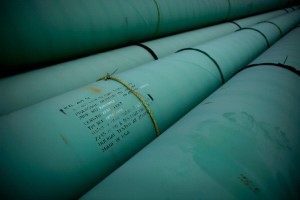Keystone XL Will Impact Climate, But Isn’t Make or Break, State Dept. Says

Photo by Tom Pennington/Getty Images
Pipe is stacked at the southern site of the Keystone XL pipeline on March 22, 2012 in Cushing, Oklahoma.
An updated review of the environmental impact of the proposed Keystone XL pipeline was released by the State Department today. The pipeline will take heavy oil harvested from tar sands in Canada to refineries on the Gulf Coast of Texas. The final environmental impact review finds that the pipeline will have an impact on the climate, but a limited one, because tar sands oil will be extracted regardless of whether or not the pipeline is built.
The pipeline, a project of the Canadian company TransCanada, has become a political football over the last few years: Republicans have attacked the President for delaying it; environmental groups say approval of the pipeline and development of tar sands means “game over” for climate change.
But drawing a line in the tar sands on this one pipeline could ignore the larger reality: the report notes that heavy oil in Canada is already being extracted, and likely to make it to the market one way or another. “Approval or denial of any one crude oil transport project, including the proposed [Keystone XL pipeline], is unlikely to significantly impact the rate of extraction in the oil sands, or the continued demand for heavy crude oil at refineries in the United States,” the State Department report says.
The section of the Keystone XL that runs from Oklahoma to Texas is already complete, and began commercial operations this month. At the moment, it is mostly carrying lighter oil from the U.S., but is expected to carry more heavy oil from Canada this year. The pipeline would likely shift to mostly transporting heavy Canadian oil if the northern segment, from Nebraska to Canada, is approved and built.
While the impact may not warrant withholding permits to complete the pipeline, the report notes that the project would impact the climate. Millions of tons of carbon dioxide would be added to the atmosphere. Overall, the process of extracting, refining and shipping tar sands oil results in about 17 percent more greenhouse gas emissions than regular oil. “Keystone XL will create the equivalent climate pollution of the exhaust of nearly 6 million cars each year, which the president cannot fail to recognize as significant and not in the nation’s best interest,” Sierra Club Executive Director said in an emailed statement.
While the Texas section is already up and running (connecting into the existing Keystone pipeline), the XL portion from Nebraska to Canada that would likely bring in more heavy oil isn’t a done deal. Further review remains before a Presidential Permit is issued, which will consider “energy security; environmental, cultural, and economic impacts; foreign policy; and compliance with relevant federal regulations and issues,” according to the State Department.
“I would say that on all those criteria, the Keystone XL pipeline is a positive, for both Canada and the United States,” Russ Girling, President and CEO of TransCanada, said during the recent start-up of commercial operations on the Texas portion of the pipeline.
TransCanada used eminent domain to route the pipeline through private land in some instances in Texas. Several cases by landowners against the pipeline are still making their way through Texas courts.
